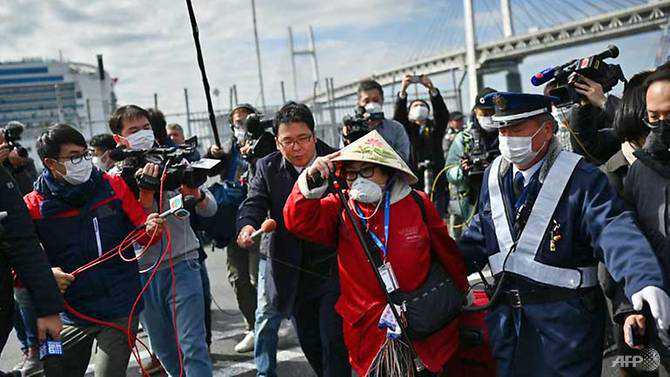More passengers to disembark in Japan from cruise liner hit by COVID-19
20 February, 2020

A second band of about 600 Japanese and foreign passengers from the coronavirus-hit cruise liner moored near Tokyo was set to disembark on Thursday (Feb 20) after a two-week quarantine on board, as criticism of Japan's handling of the outbreak mounted.
At least 621 of the passengers on the Diamond Princess liner have been infected on the ship, which includes been quarantined since Feb 3, at first with about 3,700 persons on board.
The cruise liner is easily the largest cluster of infected persons outside China.
The rapid spread of the disease - Japan has well over half of the known cases outside China - has sparked criticism of authorities just months before the Tokyo Summer Olympics.
About 500 passengers were set to disembark on Thursday while another 100 persons were to leave for chartered flights home, a health ministry official said.
A short batch of passengers who had tested negative and shown no symptoms disembarked on Wednesday. Those who have shared an area with people testing positive must stay onboard longer, as will crew.
"I'm relieved ... I would like to take a good rest," said a departing 77-year-old Japanese passenger, who declined to provide his name. He said he'd be boarding Japan's famously crowded railway system to head home.
A fleet of yellow-dotted city buses, and also a dozen roughly taxis, whisked away the passengers, a lot of whom dragged their luggage behind them and waved to former ship-mates on balconies because they disembarked.
More than 150 Australian passengers also arrived home after a pre-dawn departure from Tokyo's Haneda airport. They face another 14-day quarantine.
Buses escorted by police cars transported the Australian passengers from Yokohama to Tokyo's Haneda Airport late Wednesday. The buses drove the Australians right to the tarmac, where they boarded the government-chartered plane.
Some Hong Kong passengers also went home, while Canadians were to leave on a charter flight later on Thursday.
Earlier in the week, america evacuated a lot more than 300 nationals on two chartered flights.
A US STATE DEPT. official said there were still about 45 People in america on board the cruise liner as of Thursday.
Americans flown back must complete another 14 days quarantine, as will returning Hong Kong residents.
Disembarked Japanese passengers, however, face no such restrictions, a decision which has sparked concern.
'MAJOR FAILURE'
"If any of those 500 individuals (who disembarked) are infected, we will not be able to contain it," opposition lawmaker Kazunori Yamanoi was quoted by domestic media as telling Health Minister Katsunobu Kato in parliament on Wednesday.
Kato defended the government's response again on Thursday, telling parliament that while a ship differed from a hospital, officials had responded daily to issues pointed out by experts.
Japan's chief cabinet secretary, Yoshihide Suga, when asked at a news conference why Japanese leaving the ship didn't need to spend another two weeks in quarantine, described the advice of Japan’s National Institute of Infectious Diseases (NIID).
The NIID said there should be no problem if people had displayed no symptoms for two weeks and had tested negative for the virus through the period their health was under surveillance.
Kentaro Iwata, a professor at the infectious diseases division of Kobe University, blasted the on-ship quarantine as a "major failure, a blunder".
"It really is highly likely secondary infections occurred," Iwata told AFP, saying scepticism from abroad of the quarantine was "only natural".
He later said in a video published online that he was self-quarantining after a short visit to the ship, where he raised major concerns about the procedures up to speed.
"It was completely chaotic," he said.
Besides those on the cruise liner and returnees brought home from Wuhan city, the epicentre of the epidemic, about 70 cases of domestic infections have been confirmed in Japan, including 25 in Tokyo, public broadcaster NHK reported.
The spread of the virus has raised concerns about planning the Tokyo Summer Olympics and also the effect on Japan's economy.
The disease has claimed more than 2,000 lives in China and spread panic worldwide.
Hundreds more cases have already been reported in two dozen countries, including in Iran, which reported its first two cases of the virus - both fatal. Those were the first deaths in the Middle East.
Source:
